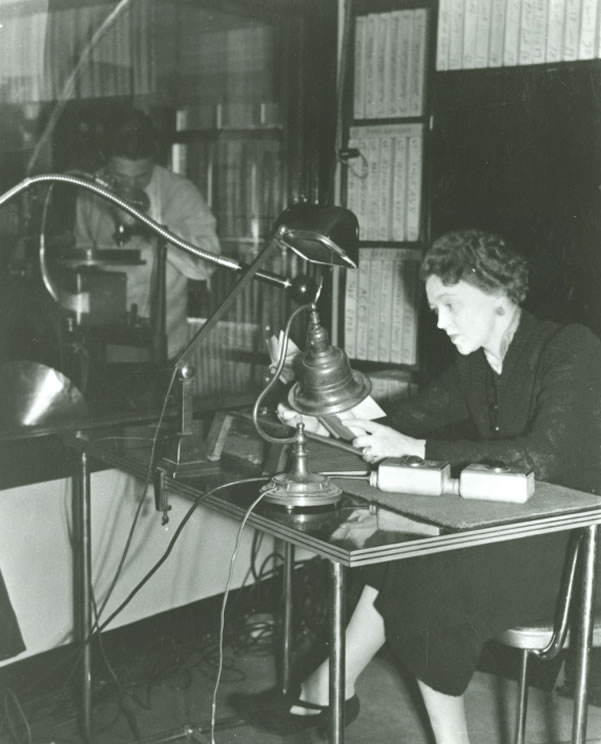Actor Eva LeGallienne recording Oscar Wilde's Birthday of the Infanta for the American Foundation for the Blind, 1939. LeGallienne sits in a recording studio. A glass wall separates her from a technician in the other room. The actor holds a book above a wooden book stand. Two angled lamps and a microphone with a long-coiled metal neck face her. Containers of Talking Books line the back wall. Talking Book Archives, American Foundation for the Blind.
The Birthday of the Infanta and The Nightingale and the Rose, Oscar Wilde, recorded 1939
The Happy Prince, Oscar Wilde, recorded 1943
Stories of Hans C. Andersen, recorded 1943
With a Quiet Heart, Eva LeGallienne, recorded 1954
Too Late the Phalarope, Alan Paton, recorded 1954
Select to listen to audio: MP3 Audio of The Happy Prince
Transcript of The Happy Prince
The Happy Prince by Oscar Wilde. Recorded solely for the use of the blind in the Talking Book studios of American Foundation for the Blind incorporated. Read by Eva LeGallienne.
The Happy Prince
High above the city, on a tall column, stood the statue of the Happy Prince. He was gilded all over with thin leaves of fine gold, for eyes he had two bright sapphires, and a large red ruby glowed on his sword-hilt.
He was very much admired indeed. 'He is as beautiful as a weathercock,' remarked one of the Town Councillors who wished to gain a reputation for having artistic tastes; 'only not quite so useful,' he added, fearing lest people should think him unpractical, which he really was not.
'Why can't you be happy like the Happy Prince?' asked a sensible mother of her little boy who was crying for the moon. 'The Happy Prince never dreams of crying for anything.'
'I am glad there is someone in the world who is quite happy,' muttered a disappointed man as he gazed at the wonderful statue.
'He looks just like an angel,' said the Charity Children as they came out of the cathedral in their bright scarlet cloaks, and their clean white pinafores.
'How do you know?' said the Mathematical Master, 'you have never seen one.'
'Ah! but we have, in our dreams,' answered the children; and the Mathematical Master frowned and looked very severe, for he did not approve of children dreaming.
One night there flew over the city a little Swallow. His friends had gone away to Egypt six weeks before, but he had stayed behind, for he was in love with the most beautiful Reed. He had met her early in the spring as he was flying down the river after a big yellow moth, and had been so attracted by her slender waist that he had stopped to talk to her.
'Shall I love you?' said the Swallow, who liked to come to the point at once, and the Reed made him a low bow. So, he flew round and round her, touching the water with his wings, and making silver ripples. This was his courtship, and it lasted all through the summer.
